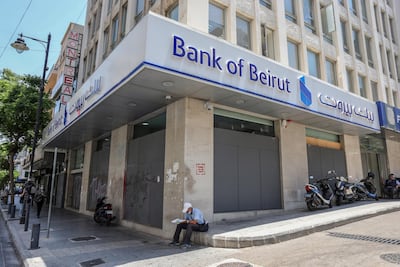Many experts have described it as the worst economic crisis in Lebanon's history.
The Lebanese pound's value has dropped to record lows against the dollar, food prices have gone up and unemployment has risen drastically as more businesses shut their doors.
Coupled with a global pandemic, it has become a hopeless situation for many, including artists in the film and television industry.
A "sinking Titanic" is how director Tony Eli Kanaan, 27, describes it. "I am super frustrated. I'm super numbed. I hate that we have adapted to this situation," Kanaan tells The National.
"We have just adapted to this joke and that is what is frustrating me, other than the denial and the numbness I feel," he adds.
Also a writer and actor, Kanaan's career only recently started to take off, and his ultimate goal is to go to Los Angeles to pursue acting professionally. "I'm trying to get out of here," he says. "I still think whoever has the chance to leave, should leave."
His message might surprise some, considering the success the young filmmaker has started to garner in his home country. Thanks to the comedy skits he posts on his Instagram page, Kanaan has racked up more than 50,000 followers in fewer than five months.
However, despite his growing social media following, Kanaan says it is hard to not have a pessimistic view. "My perception of Lebanon is complete doom. How sustainable is this life?"

And these feelings of despair are not just felt by the younger generation. The same sentiment is echoed by creatives who have been in the production industry for years.
'Who is going to invest in films?'
Nasser Fakih is the veteran Lebanese TV director behind popular shows such as La Youmal, Mafi Metlo and Beit El Kell. He says projects have been put on hold because producers have not been able to pay their crews in dollars. Yet, the ramifications are more than merely financial.
"The problem is also mental and psychological, because an artist has to be in a certain environment in order to work. When the environment is negative and everything around him is falling apart, it becomes difficult for an artist to really excel in his or her field," he says.
Having worked in the industry for almost three decades, it is a situation Fakih says is painful to witness.
"We have such a beautiful country which is [like] a natural studio. But who is going to invest in films when people are losing their jobs and going hungry?"
'I don't want my kids to go through the same pain'
Anjo Rihane, 42, asks a similar question. For the actress, the situation led to the cancellation of a play she was in, which had been running for a year.
"The first thing that people stop doing [during an economic crisis] is going to the theatre. I also had a television series, but that has been postponed," she tells The National.

"I don't think there is any Lebanese who has not put in place a plan B, even those who tell you that they are against leaving the country," she says.
As a mother of two, the thought of emigration hovers over her head like a ghost, she says. "I don't want my kids to go through the same pain."
The pain Rihane speaks of is shared by most Lebanese people. Many have seen their life's savings disappear overnight, due to the devaluation of the currency, and on top of it all, they do not have access to their funds at the banks.
"Quite simply, I want my rights," Rihane says. "I want my kids to live in a country where they don't have to be afraid of a stray bullet, where they don't get asked about their religion. Nor do I want them to use 'wasta' to get anything done."
Despite everything, Fakih still has a sense of hope, though he admits optimism is becoming ever harder to find. At 50, he does not consider emigration an option.
"I would not like to throw away everything I have achieved over all these years in my field, and go somewhere else where I might or might not succeed.
"However, I would understand if someone has given up hope and decided to emigrate, whatever field they are in," he says.
"I still have hope and I believe we cannot live without hope. Hope is part of human nature and the disappearance of hope means the end of dreams, of life of everything that is good in this world," the director adds.
While Fakih and Rihane still hold on to hope as they see fellow citizens continue to march on the streets demanding change, the real fear is if they, like Kanaan, also decide it is time to pack their bags and leave Lebanon behind them.



